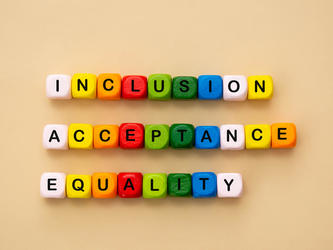The future of accessibility research
Almost a decade ago, I was filling in a student halls application form when I felt myself hovering between the ‘no’ and ‘yes’ tick box. The question was whether or not I am a person with disability needs.
It was one of the only few times I was made aware that my needs were a little bit different from regular students: I have a hearing loss that requires me to wear hearing aids. I was lucky my parents got me help before starting school, but many people go into adulthood without receiving support.
Insights from research among the deaf and hearing impaired can make the difference between children reaching their full potential or ending up in systems that are poorly adapted to their needs. Inaccessibility can leave people isolated from society, becoming excluded from higher education, the job market and many more social engagements.
Efforts to make public sector services accessible differs by nation, but since September 2020, public sector organisations in the UK must have accessible websites or risk breaking the law.
There is also a cost of content not being accessible. The World Economic Forum states that disability exclusion costs OECD countries 7% of their gross domestic product, an estimate that would suggest disability exclusion costs the UK roughly £153.8bn. Looking at accessibility from a purely economic perspective, there is significantly more to lose through the exclusion of people with disabilities.
Not long ago, the widespread view was that accessibility research should be led with empathy as a paradigm. Designers and researchers often advocate putting the user at the centre of accessibility research, as it has become clearer that to effect real change, we should listen to the experts in accessibility: the users themselves.
To foster inclusivity and create products and services for all, accessibility is essential, not just a ‘nice-to-have’. I believe we should place expertise at the centre, rather than empathy. But how can you build a product without putting yourself in the shoes of someone with accessibility needs?
Several experts have expressed their discontent about accepted practices: interviewing a hearing person about deaf people’s problems, airing a commercial about a person with a disability geared at the general public, and deaf people who are not able to attend virtual events. These examples illustrate three different cases of virtue signalling, or I would argue a form of pathological altruism, that fail to include the most important people in the conversation: the subject. So, what should the future of accessibility look like?
There are multiple avenues to explore how accessibility research can be informed by experts. One such avenue is social media, a space which many influencers with disabilities and disability educators and advocators occupy to raise awareness and to educate others. The increased usage of social media due to the pandemic has unintentionally led to an increase in visibility of the day-to-day life of people with disabilities. With this increase in visibility, it has become evident that the definition of empathy in research needs reconsideration.
Empathy remains important in research, but people with accessibility needs should be active participants in research. They should be the drivers of change, and as such, need to be listened to as experts on the topic.
In the last few years influencers who educate viewers by raising awareness and furthering their knowledge on various conditions have become much more common on social media. The ways this can be leveraged has perhaps been overlooked, but could provide insights that empathy-led research lacks. Hashtags like #disability #disabilityawareness and #disabilityadvocate take you to accounts of influencers discussing disabilities. The great thing about these channels is that viewers ask questions which influencers can dedicate a video to or answer in the comments.
This can be very informative to researchers and designers who are struggling to find new avenues to do disability research or finding experts on specific conditions.
These developments do not mean that empathy is no longer an important skill. Empathy is always needed to effectively communicate with people participating in your research, especially those with different needs. When it comes to accessibility research, expertise comes in different forms. One form is bringing experts into your research session to form a deeper understanding of certain accessibility needs.
Social media is a good way to let experts inform accessibility research. Some researchers and designers have stepped away from leading with empathy, whereas others are still advocating for empathy-led accessibility research. Others may have found themselves in a liminal space between empathy and expertise. However, with increased visibility of experts online, the need to focus on expertise-led accessibility research is increasing and will continue to do so.
Given that empathy as a skill rather than a framework is still vital, perhaps the future of accessibility research should strive for a paradigm shift where we practice ‘exempathy’: expert-led accessibility research with a dose of empathy.
Cheyenne Ritfeld is researcher at Simple Usability.

We hope you enjoyed this article.
Research Live is published by MRS.
The Market Research Society (MRS) exists to promote and protect the research sector, showcasing how research delivers impact for businesses and government.
Members of MRS enjoy many benefits including tailoured policy guidance, discounts on training and conferences, and access to member-only content.
For example, there's an archive of winning case studies from over a decade of MRS Awards.
Find out more about the benefits of joining MRS here.












0 Comments